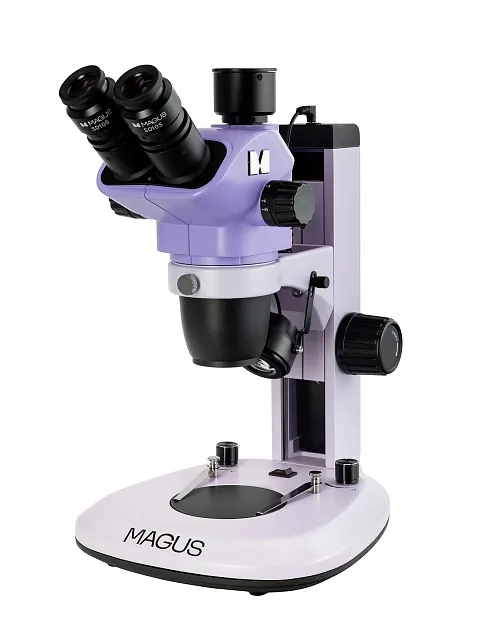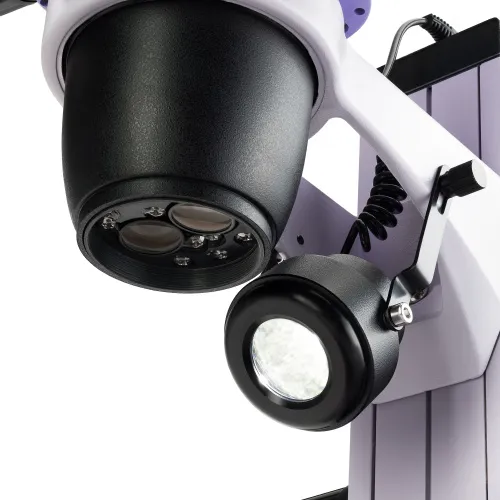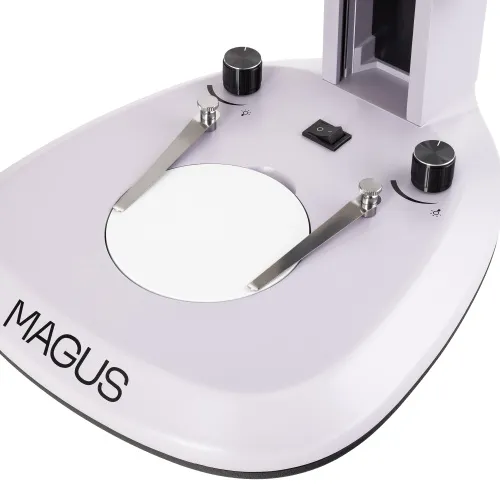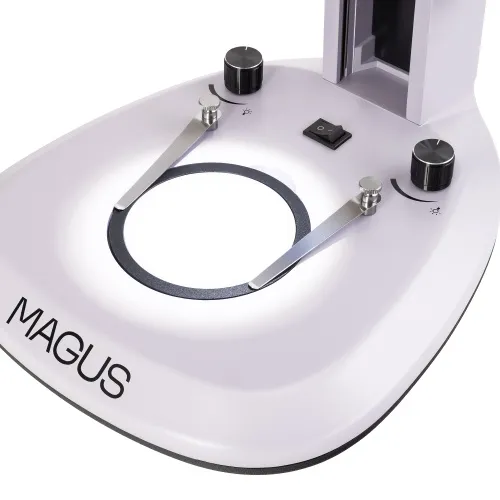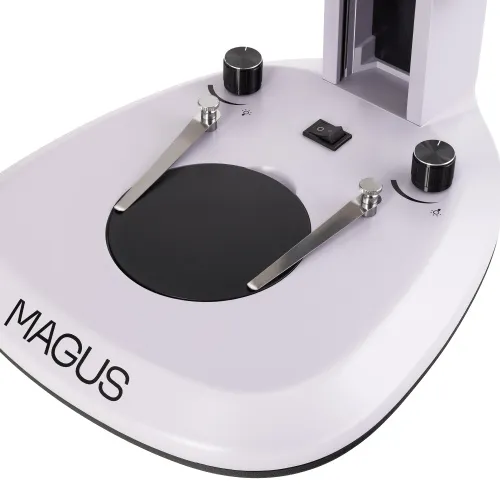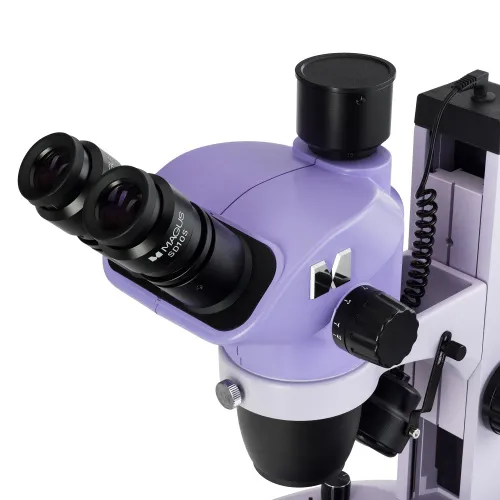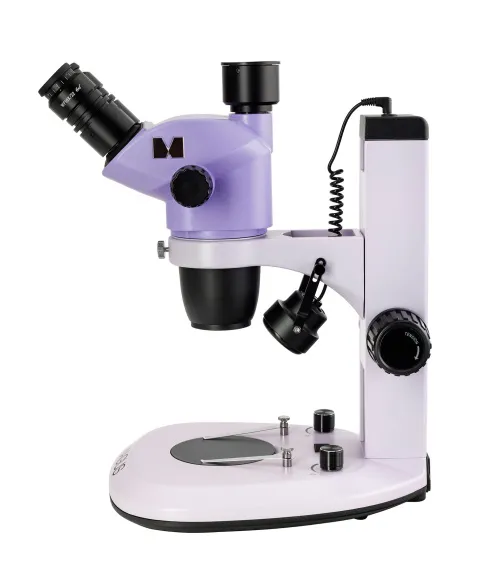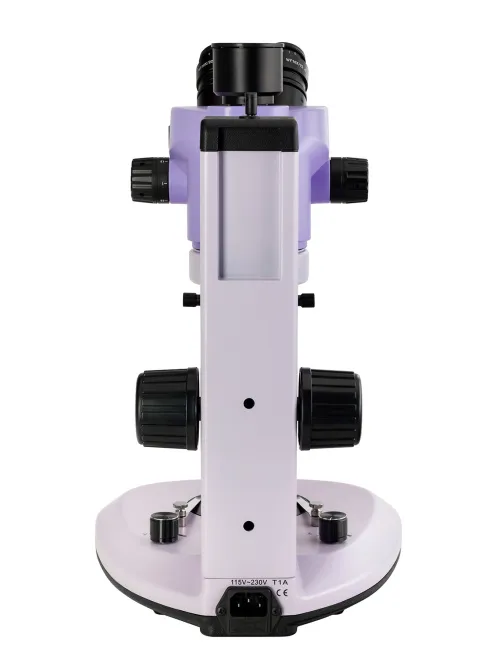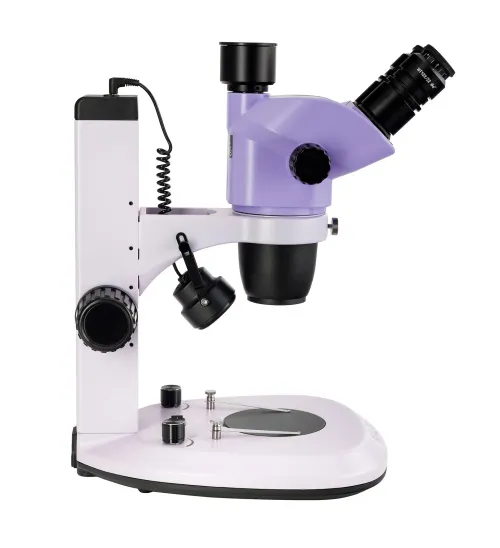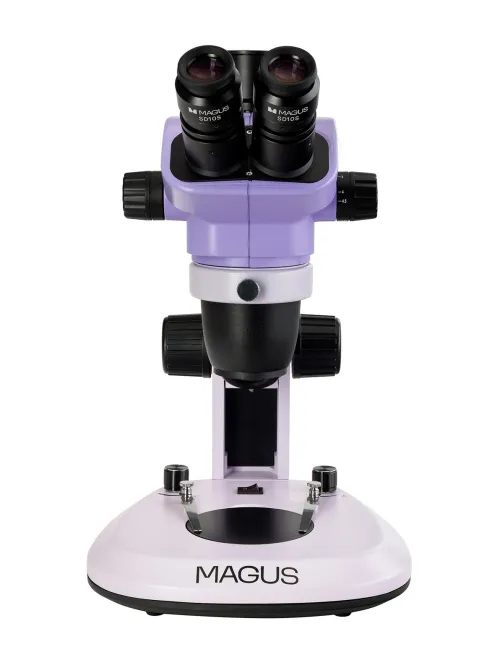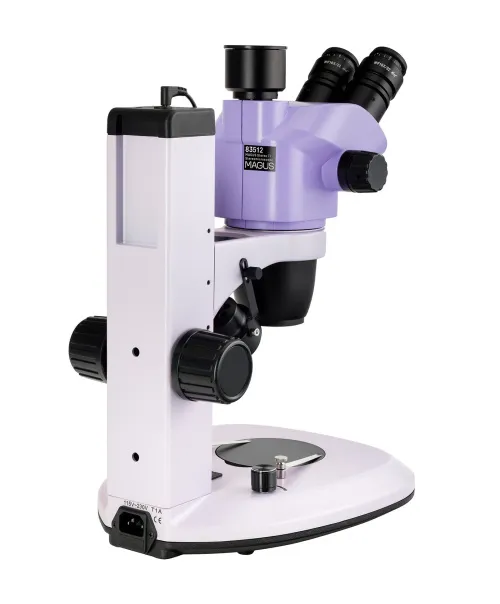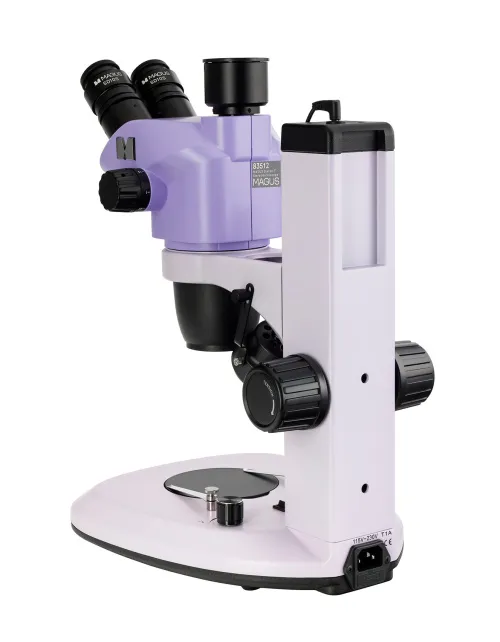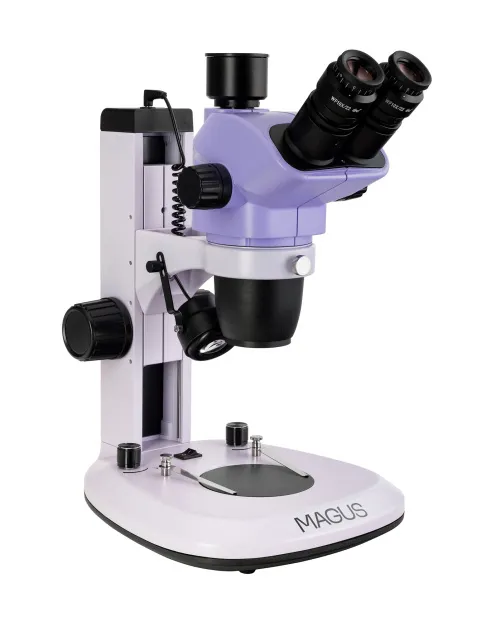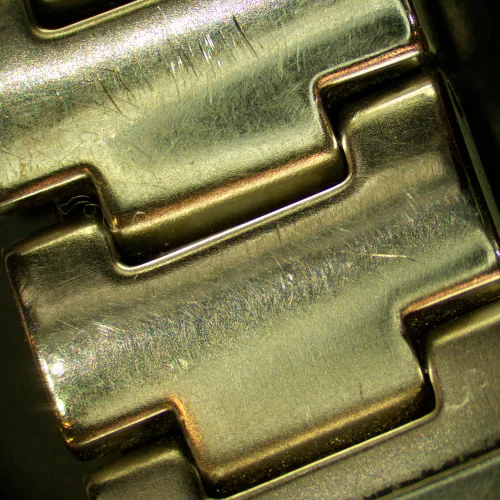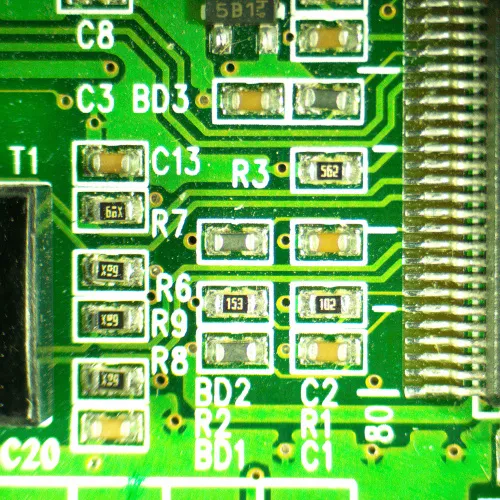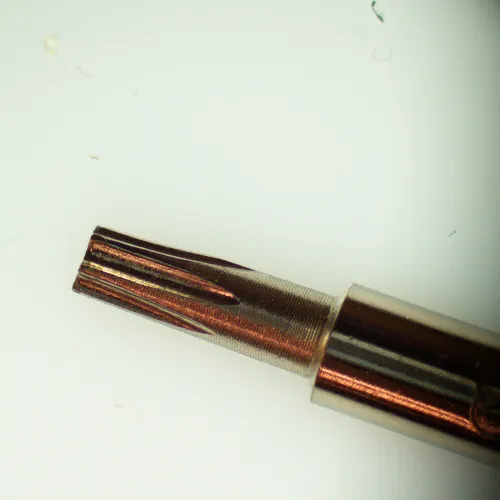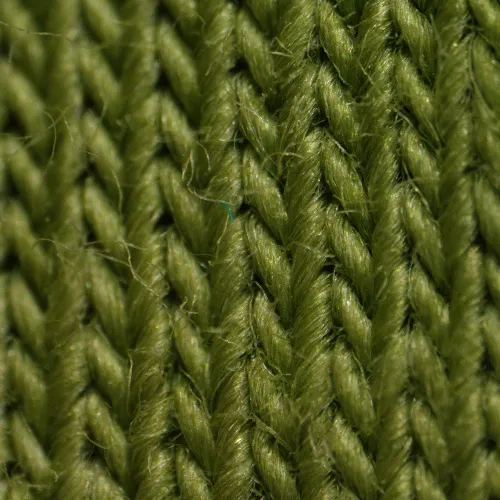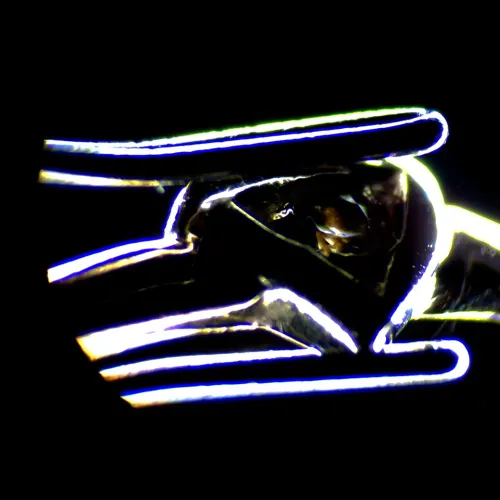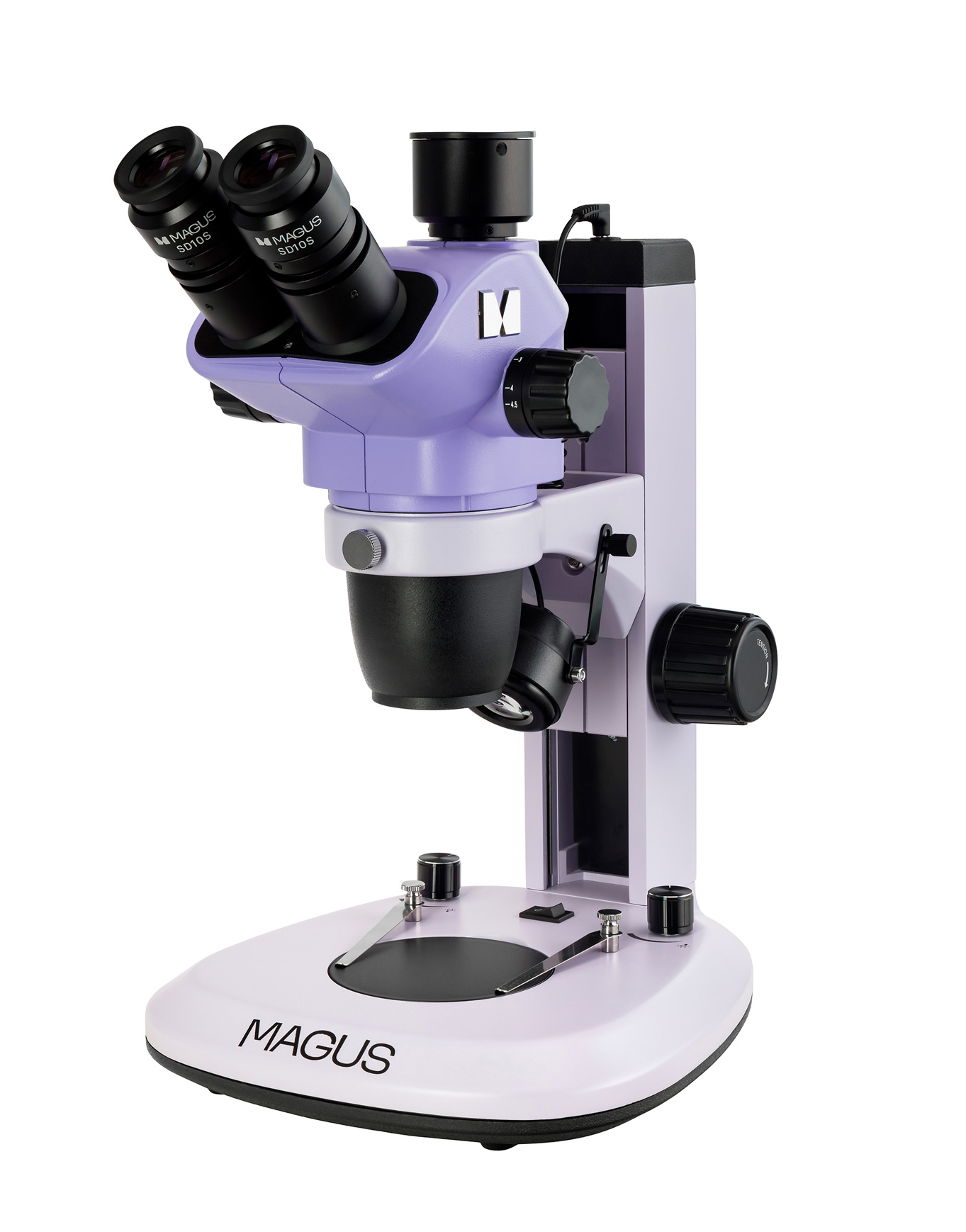MAGUS Stereo 7T Stereomicroscope
Magnification: 6.7-45x. The Greenough optical design. Trinocular head, 3W LED transmitted light illuminator, 3W LED reflected light oblique illuminator
| Product ID | 83512 |
| Brand | MAGUS |
| Warranty | 5 years |
| EAN | 5905555019772 |
| Package size (LxWxH) | 52x37x37 cm |
| Shipping Weight | 7.4 kg |
The stereomicroscope is designed for studying three-dimensional objects and their structure. The microscope is equipped with built-in transmitted and reflected light illuminators for observing transparent and opaque specimens. Polarized light and darkfield techniques are available.
The Greenough optical design provides a large depth of field and delivers three-dimensional image thanks to a 15° stereo angle. The microscope magnifies the image of the specimen without loss of spatial orientation. Observing specimens placed on the 105–177mm stage is convenient, and so the microscope is suitable for restoration, soldering, assembly, quality control, and other similar operations.
Microscope head
The trinocular head rotates 360° and can be fixed in any desired position. The digital camera is installed in the trinocular tube by using a C-mount adapter. Additional adapters with different magnifications are available for order.
The base kit includes 10x/22mm eyepieces with diopter adjustment and a long eye relief for working with glasses.
Zoom
The objective smoothly increases magnification up to 6.7x without focus reduction. The microscope delivers an upright (not inverted) three-dimensional image. Additional auxiliary objective lenses may increase the magnification range, change the field of view, and working distance of the microscope.
Focusing mechanism
The coarse focusing knobs are on both sides. The coarse focusing tension can also be adjusted.
Stage plate
You can choose a transparent or black-and-white plate depending on the sample. The transparent plate ensures homogeneous illumination of the specimen and optimal light diffusion for observing transparent and translucent samples. The black-and-white plate is ideal for observing opaque samples against a contrasting background: The black side is for light-colored objects, and the white side is for dark-colored objects.
Light source
The microscope is equipped with an LED transmitted light illuminator (3W) and a reflected light oblique illuminator (3W). The LED has a lifespan of 50,000 hours.
Accessories
There is a line of accessories designed for this microscope.
Eyepieces and auxiliary objective lenses can extend the magnification range of the microscope.
A digital camera outputs the image from the microscope to a monitor.
C-mount adapters connect the camera to the microscope; the adapter magnification is selected depending on the size of the camera matrix.
A calibration slide helps with precise measurement of specimens. The scale value on the calibration slide of stereomicroscopes is 0.1mm.
The polarization device is used to study anisotropic objects.
A darkfield condenser with jewelry tweezers will allow you to study precious and semi-precious stones.
A ring illuminator with a polarizer will remove glare from images of polished metal surfaces.
The mechanical stage moves objects smoothly and without jerking in two axes and provides additional convenience when working at a magnification of over 20x.
A ring illuminator with sector switching and a gooseneck light are used to fine-tune the illumination of the work area. The light is set at the selected angle, creating the light and shadow necessary for the study, and the right part of the specimen remains illuminated.
Universal stands will expand the working area and provide more freedom in choosing the position of the microscope head above the workplace.
Key features:
- Zoom system for achieving smooth magnification without focus reduction; zoom ratio of 6.7:1
- Trinocular head with 360° rotation and a trinocular tube for mounting a digital camera
- The advantages of the Greenough optical design: large depth of field, dimensionality, compact design, and reasonable price.
- LED transmitted light illuminator (3W) and LED reflected light (3W) illuminator with a long lifetime
- A wide range of compatible optional accessories
The kit includes:
- Base with built-in transmitted light source, built-in power supply and stand with a focusing mechanism
- Microscope head – objective with trinocular head
- Eyepiece 10x/22mm with long eye relief and diopter adjustment (2 pcs.)
- Black-and-white plate
- Transparent plate
- Reflected light oblique illuminator
- AC power cord
- Dust cover
- User manual and warranty card
Available on request:
- 10x/22mm eyepiece with scale
- 15x/16mm eyepiece (2 pcs.)
- 20x/12mm eyepiece (2 pcs.)
- 25x/9mm eyepiece (2 pcs.)
- 30x/8mm eyepiece (2 pcs.)
- Auxiliary objective lens 0.5x
- Auxiliary objective lens 1.5x
- Auxiliary objective lens 2x
- C-mount adapter 0.5x
- C-mount adapter 1x
- Polarization device
- Darkfield condenser
- Ring illuminator with polarizing filter
- Ring illuminator with sector switching
- Gooseneck illuminator
- Mechanical stage
- Universal stand with focusing mechanism
- Jewelry tweezers
- Digital camera
- Calibration slide
| Product ID | 83512 |
| Brand | MAGUS |
| Warranty | 5 years |
| EAN | 5905555019772 |
| Package size (LxWxH) | 52x37x37 cm |
| Shipping Weight | 7.4 kg |
| Type | stereo/instrumental |
| Microscope head type | trinocular |
| Head | 360 ° rotatable, lockable in any position |
| Head inclination angle | 45 ° |
| Magnification, x | 6.7 — 45 |
| Magnification, x (optional) | 3.4–270 |
| Zoom ratio | 6.7:1 |
| Eyepiece tube diameter, mm | 30 |
| Eyepieces | 10x/22 mm, long eye relief (*optional: 10x/22 mm with scale, 15x/16, 20x/12, 25x/9, 30x/8) |
| Objectives | 0.67–4.5x (*optional: when using additional eyepieces and auxiliary objectives: 3.4–270x) |
| Working distance, mm | 105 (optional: when using additional eyepieces and auxiliary objectives: 177, 47, 26) |
| Interpupillary distance, mm | 54 — 75 |
| Linear field of view, mm | 32.8 — 4.9 |
| Stage, mm | Ø95 |
| Stage features | black/white plate, transparent plate |
| Eyepiece diopter adjustment, diopters | ±5D on each eyepiece |
| Eyepiece diopter adjustment | ✓ |
| Focus | coarse (106mm, with coarse focusing tension adjustment) |
| Illumination | LED |
| Brightness adjustment | ✓ |
| Power supply | 115–230V, 50/60Hz, AC network |
| Light source type | reflected light: oblique illuminator – 3W LED; transmitted light: 3W LED |
| Operating temperature range, °C | 0...+40 |
| Ability to connect additional equipment | auxiliary objectives (0.5х, 1.5х, 2х), darkfield condenser, polarization device |
| User level | experienced users, professionals |
| Assembly and installation difficulty level | complicated |
| Optical scheme | Greenough stereomicroscope |
| Application | for applied research |
| Illumination location | dual |
| Research method | bright field |
| Pouch/case/bag in set | dust cover |
We have gathered answers to the most frequently asked questions to help you sort things out
Find out why studying eyes under a microscope is entertaining; how insects’ and arachnids’ eyes differ and what the best way is to observe such an interesting specimen
Read this review to learn how to observe human hair, what different hair looks like under a microscope and what magnification is required for observations
Learn what a numerical aperture is and how to choose a suitable objective lens for your microscope here
Learn what a spider looks like under microscope, when the best time is to take photos of it, how to study it properly at magnification and more interesting facts about observing insects and arachnids
This review for beginner explorers of the micro world introduces you to the optical, illuminating and mechanical parts of a microscope and their functions
Short article about Paramecium caudatum - a microorganism that is interesting to observe through any microscope

